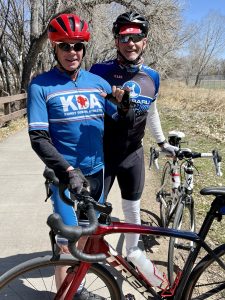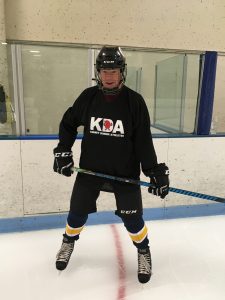My Kidney Donation: The Story of an Everyday Athlete
On September 11, 2018, at age 60, I became a non-directed kidney donor. I live in Denver, Colorado, and my kidney went to a 60–70-year-old white male in New York City. His operation took place at one of the original transplant centers, at Columbia University Hospital. I knew nothing else about my recipient except that the operation went great and my kidney was functioning well.
I grew up a military brat. My dad was an Air Force pilot for 22 years, and we moved basically every three years, living close to war zones; France in the mid-60s and Okinawa in the late 60s and early 70s. So, I know no one before my college friends. Immediately after I graduated from Miami University in 1980, I moved from Ohio to Colorado with some of them. In college, I was on the school’s equestrian team and learned to ice skate, eventually helping teach ice dancing. And I started attending hockey games. I had always been a road bike rider. Moving to Colorado allowed that to grow.
Sometime in my 40s, I started considering donating a kidney. By the time I actually asked about registering, I was told I was too old. So I kept donating blood, as well as my time to various things. A couple of years ago, we’d done the Donor Dash and I decided to ask again about the donor age requirement. I was told things had changed, and that I could be a donor!
Kent Martin
I had run track in high school, and I started doing some races in Colorado early on. My best time in the Bolder Boulder was 44 minutes, my best 10K was 41 minutes, and my best 5K was right at 20. My wife and I have done lots of 5K and 10K races throughout our 33 years together, and the Denver Donor Dash, now in its second year, has become a don’t-miss event.
My wife, Pat, is a pediatric nurse, so I quickly became exposed to many aspects of children’s health, and then I became a parent. Miracle number one in my life. Our son needed some help getting through the first few months, and during that process, I donated him some blood. I had never done that before, but I’ve now been a regular O-negative donor for 30+ years.
I grew up legally blind, but participated in many sports throughout my life, starting in 7th grade and continuing on to climbing many 14ers in Colorado and skiing black slopes while still legally blind. My son inherited my eye problems, and in the doctor’s evaluation of his eyes, he looked at mine. His next words changed my life. “I can fix you,” he said. I’d never heard that. So, on my 33rd birthday, the day the first Gulf War started, I experienced miracle number two in my life: I had cataract surgery, and I could see. A few months later, I had my other eye done, and I soon got my driver’s license. Look out world!
Sometime in my 40s, I started considering donating a kidney. By the time I actually asked about registering, I was told I was too old. So I kept donating blood, as well as my time to various things. A couple of years ago, we’d done the Donor Dash and I decided to ask again about the donor age requirement. I was told things had changed, and that I could be a donor! Knowing the impact of being an O-negative blood donor, I figured that alone would be a large help to a recipient who can only receive O-type blood. I could give someone else a miracle in their life! Cool beans.

I made the decision to donate a kidney, got my wife’s blessing, and in November of 2017, I did the requisite 24-hour urine collection, gave a small blood sample, and then waited. I had not heard anything by early February of 2018, so I called the National Kidney Registry and asked if they had gotten my sample results. They had not, so we got them connected with the testing site, and then the ball was rolling. I was quickly contacted by the University of Colorado Hospital Transplant Center and scheduled for the first set of evaluations and tests.
My donation was scheduled for September 11, 2018. Of course, my first thought was, “Really?” But after it sunk in, and then I found out my kidney was going to a man in NYC, it cemented the course for me and I was full steam ahead! Now, 9/11 will have a much better meaning for me and this gentleman.
The Columbia Transplant Center asked that our paired operations be scheduled on the same day. So, at 3:30 AM on 9/11, I went to pre-op, with surgery scheduled for 5:30 AM. My kidney was flown directly to NYC, and the recipient’s surgery started at 7 PM that same day. At that point, I was neatly tucked into my first-ever night in the hospital, judiciously using my PCA pump and watching the Rockies on TV. All was good; I’d survived the operation and was doing well, pain and all. I was only in the hospital one night.
One thing I want to mention is that I did not fully anticipate how emotional this experience would be. I knew I was doing a great thing, and anyone who knew me knew I would not take it lightly. I was absolutely in awe of the outpouring of good wishes I received.
Kent Martin
It took a couple weeks before I was able to slowly walk a mile. Around that time, I also took a short bike ride and did not have too much pain. At three weeks, we took a hike at some altitude. It was an easy five miles on the beautiful Kenosha Pass Colorado Trail. It hurt, and I ran out of gas. We had to take our time and rest, but we made it. Like I’ve been doing all along, I pushed the limits, but just barely.
At four weeks out of surgery, my 10-pound weight restriction was lifted. I had now been to the gym a couple of times, doing quite easy things and minimal weights. I had mainly been doing the exercise bike and some core-type yoga stuff. All was good.
Throughout this process, I felt stronger by the day. Finally, my appetite was coming back. I had lost 10 pounds and was down to 176, the first time I had been below 180 in decades.
One thing I want to mention is that I did not fully anticipate how emotional this experience would be. I knew I was doing a great thing, and anyone who knew me knew I would not take it lightly. I was absolutely in awe of the outpouring of good wishes I received. Words I do not utter lightly were being said of me. I’m humbled but thankful. It made the whole experience and recovery much easier, and feeling the love gave me great energy.
With the changing of the seasons, I continued to get back to normal. I bought my ski passes and began dreaming of knee-deep powder in some high-altitude bowls. Meanwhile, I will keep slowly working to be the “everyday athlete” I was. I know it will happen.
I also started playing ice hockey at age 62, and I run a Blind Hockey program in Denver: the Colorado Visionaries. I have ridden a century road bike ride, and hike quite often. I am also a member of a wonderful donor advocacy group, Kidney Donor Athletes, and try to spread the word as much as possible, even buying KDA and Donate Life bike jerseys.
About the Author

Kent Martin is a retired IT worker who became a non-directed kidney donor at age 60 in 2018 at the University of Colorado. He lives in Colorado and enjoys outdoors activities including skiing, biking, and playing hockey. He runs a blind hockey nonprofit called the Colorado Visionaries Blind Hockey Club. He donated as a way to give back after receiving a couple of miracles in his life.